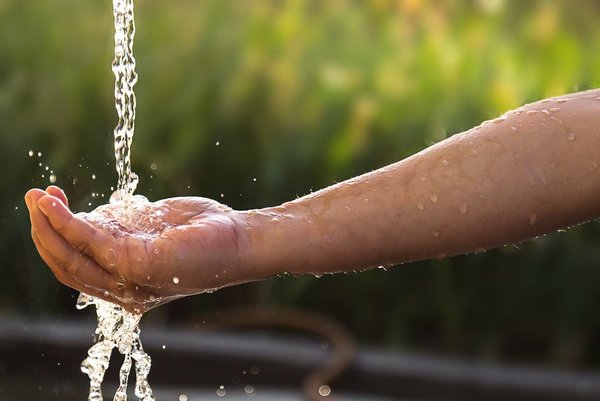 Read this article in French
Read this article in French- Share this article
- Subscribe to our newsletter
World Water Forum in Dakar meets with considerable political interest
The World Water Forum is the world's largest event on water. It has been organised every three years since 1997 by the World Water Council, in partnership with a host country. The 9th Forum was the first of its kind to be hosted in sub-Saharan Africa.
Germany calls for swifter implementation of SDG 6
With its annual contribution of around 720 million euros, Germany has already been the third largest bilateral donor in the water sector for several years. Amounting to roughly 445 million euros a year, well over half of this sum comes from the budget of Germany’s Federal Ministry for Economic Development and Cooperation (BMZ). In order to also boost this effort politically, acting as representative of the German Federal Government, BMZ State Secretary Jochen Flasbarth attended the first day of the World Water Forum in Senegal’s capital of Dakar.
In a BMZ press release, Flasbarth emphasised: "Water is life. Water counts in maintaining people’s health as well as that of the environment. Sufficient supplies of clean water and reliable sanitation also reduce the risk of conflict – especially in countries hit by crises, displacement or climate change.”
Two billion people were already lacking access to clean drinking water, Flachsbarth maintained. Climate change was aggravating the situation. In Africa, for example, every third individual had insufficient access to water supply.
This was why Germany was supporting a swifter implementation of Sustainable Development Goal 6: “Ensure availability and sustainable management of water and sanitation for all”.
German development cooperation was contributing to SDG 6 together with several partners. The BMZ was implementing water and sanitation projects in more than 50 countries, the State Secretary emphasised.
Against the backdrop of the war in Ukraine, Flasbarth demanded that, particularly in developing countries, agriculture had to be made more climate-resilient. Harvests could then be better secured, and famine could be prevented.
The climate crisis, too, was above all a water crisis – especially in rural areas, food systems were exposed to enormous pressure through flooding and drought, the State Secretary warned, stressing that “living without hunger is only conceivable if we consider water and agriculture together”.
Switzerland launches new Water Guidelines in the context of the Blue Peace Days initiative
Switzerland is making a determined effort to ensure access to safe drinking water and sanitary facilities for the poorest of the poor. On the occasion of the 9th World Water Forum, the Swiss Federal Department of Foreign Affairs (FDFA) launched the Water Guidelines 2022-2028, underscoring its engagement regarding this topic. Clear principles and priorities are to strengthen the effectiveness and coherence of Swiss contributions in the water sector.
According to a press release in the run-up to the World Water Forum, ever since Swiss development cooperation began, the FDFA has engaged in activities in the field of water in many ways, including in the areas of access to drinking water, basic sanitation and hygiene, integrated and sustainable water management, the protection of water resources against pollution or acting as an intermediary between riparian countries with the aim of peaceful and sustainable use of cross-border bodies of water.
For example, the FDFA press release points out that Switzerland has long been contributing to developing solutions to challenges concerning the topic of water, an area in which it has established much expertise. Here, all three instruments of international cooperation, humanitarian aid, strategic development cooperation and peace-building, are being put to use simultaneously and in parallel, the FDFA explains.
In order to favourably attune these instruments and the wide range of measures to one another, the “Water Guidelines 2022-2025” emphasise principles, topics and priorities which activities are going to be oriented on in future. They were presented to the public on the occasion of World Water Day in February and at the World Water Forum in Dakar.
The FDFA’s press release stresses that the Guidelines constitute an important contribution to the effectiveness of international cooperation regarding the topic of water for the benefit of the global South.
(BMZ/FDFA/wi)
Further information:
FDFA publication on Guidelines for Water 2022-2025





Add a comment
Be the First to Comment